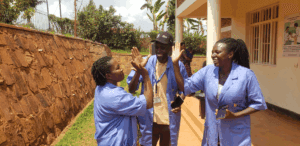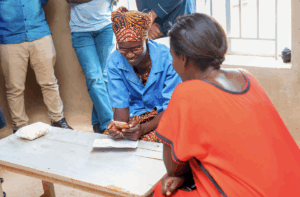Nurturing Hope in Rwandan Healthcare Settings
Nurturing Hope in Rwandan Healthcare Settings: Exploring Factors that Influence Hope Among Healthcare Providers, Pregnant Women, and Mothers with Children Under Five Years.
Authors: Angele Bienvenue Ishimwe, Annick Gloria Uwitonze, Sarah Mullane, Valens Hafashimana, Diana Nambatya Nsubuga, Sandra Isano, Diana Rujema, Talia Gramiccia, Wendy Leonard
Our new research explores how hope, often overlooked in Healthcare settings, plays a critical role in healthcare delivery, particularly for healthcare providers (HCPs) and healthcare recipients (HCRs) such as pregnant women and mothers with young children.
In Rwanda’s rural healthcare settings, a quiet but powerful force is shaping outcomes for both patients and the people who care for them: hope. This research, published in PLOS Global Public Health explores how hope influences the HCPs who serve them. The research, conducted in partnership with Rwandan and international collaborators, offers vital insights into what strengthens hope, and how we can harness it to build more resilient, compassionate, and effective healthcare systems.
Hope, the study suggests, is far more than a feeling – it’s a catalyst. When nurtured, hope supports trust, engagement, and openness between healthcare providers and recipients. It increases the likelihood that women will seek and return for care, and that providers, even in resource-limited settings, remain motivated and committed. The research referred to the three established components of hope: interconnectedness (the sense of trust and emotional connection between patients and providers), readiness for change (the willingness to adopt new health behaviors or professional practices), and future orientation (a positive outlook and belief in better health outcomes).
Using interviews and focus groups with 144 mothers and 81 healthcare workers across three districts in Rwanda’s northern province, the study revealed four key themes that influence hope. First, strong relationships, especially those built through respectful and compassionate communication, play a crucial role in making patients feel safe and engaged. When providers took time to listen, show empathy, and explain care clearly, patients responded with trust and a deeper willingness to follow health advice. The relationships among healthcare workers themselves also mattered; mutual support and teamwork strengthened morale and improved care quality.
Second, patients’ trust in the health system is shaped by their direct encounters with care. A single negative experience: rude treatment, lack of explanation, or being dismissed, can discourage women from returning to a health facility. On the other hand, positive experiences often ripple outwards, as women share their stories with other mothers and families. But even compassionate care is limited by system-level challenges. Many patients spoke about the difficulty of accessing referred care, high transport costs, and the emotional toll of being unable to afford continued treatment.
Third, the study found that education and belief systems significantly impact hope and the ability to accept change. When patients were given the tools to understand their health conditions and the rationale for treatments, they felt more empowered to take charge of their health. Providers, too, expressed a need for consistent training and preparation when changes were introduced in the system. Faith was another important theme. For many, it provided a foundation of strength. But at times, religious beliefs created tension around issues like family planning, affecting both the delivery and acceptance of care.
Finally, the research highlighted the deep sense of purpose that drives many Rwandan healthcare providers. Despite long hours, resources shortages, and limited compensation, many expressed pride and passion for their roles. Yet, persistent systemic challenges, such as inadequate pay, unclear career progression, and overwhelming workloads, diminished their motivation and ability to deliver hopeful, future-focused care.
This study reminds us that hope is not abstract, it is built through every patient interaction, policy decision, and leadership approach. And while investments in infrastructure and training remain essential, so too is investing in the human experience of care. As Rwanda continues its journey toward achieving maternal and child health goals, nurturing hope must be at the heart of the strategy.
For our supporters, this work reaffirms why holistic, people-centered care matters. Your partnership allows us to support programs that don’t just treat illness but uplift communities by training healthcare providers in compassionate communication, improving system responsiveness, and ensuring women and children are treated with dignity and care. Building on these insights, we are also launching a well-being awareness program for healthcare providers and implementing our validated measurement tools to monitor hope and resilience within healthcare settings. These next steps are part of our commitment to creating sustainable, systemic change that supports both those receiving care and those providing it.
Together, we can continue building a health system that delivers not just services, but hope.



SHARE THIS STORY
